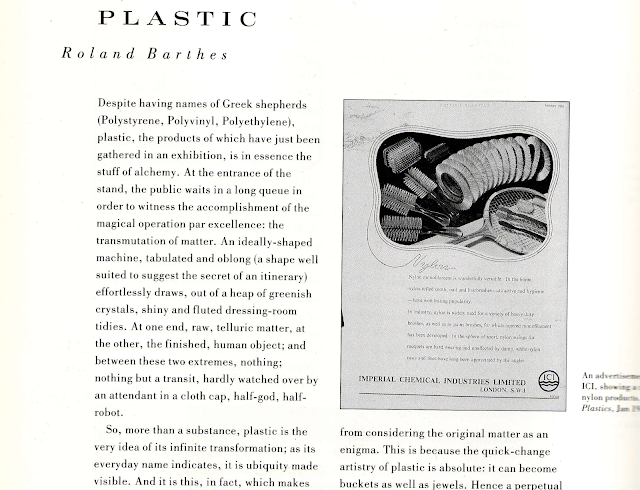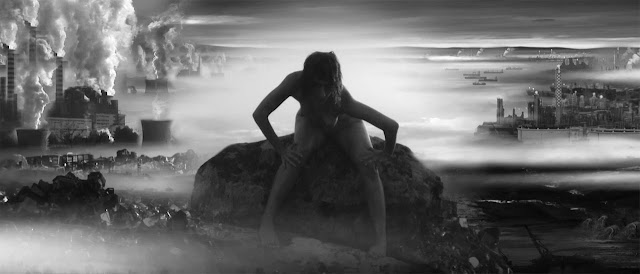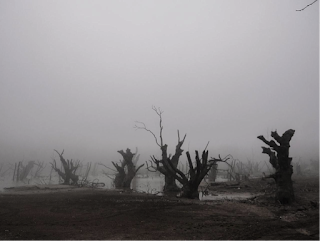Dark Alchemy: How Plastic took us to a horror ride through the Capitalocene
 |
| Excerpt from Roland Barthes' text on plastic |
It was 60 years ago that Roland Barthes heralded the
expanded use of plastic
as a magic moment par excellence. The cheap, transmutable material captured the
imagination of those pushing boundaries in the heroic days of the modernist
era. Barthes reached out to the commonplaceness of the debased by the
bourgeoisie material as a metaphor that suited a fight against exclusion.
Uncannily versatile, plastic was spread to the point of being practically
unseen. This was democratic magic, the everyday access to a corpus
Hermeticorum, to science and its amazing possibilities.
CUT to the 21st century [and I would suggest
that Rolling Stones music
enters for the dive into how modernity’s promise for clean accessibility and
abundance rotted]
Chris Jordan’s photographic series “Midway: Message from the Gyre” captured
in 2009 the indestructible plastics that outlived the carcasses of the
albatross that had digested them.
In our new, and not so brave world we may all
be progenies of a toxic metamorphosis as we are feeding on mutated by plastic
organisms: Alas, Barthes was right, life itself has been plasticised and we
have to deal with the monstrous reality of the Plastisphere and economies that
support and perpetuate
it.
 |
| "Plastic Geoengineering" |
In Figures
> The world is choking in plastic. In 1950 the world produced roughly
1.9 million tonnes of plastic. This figure mounted to 330 million tonnes in
2013. This is expected to double within the next 20 years and potentially quadruple
by 2050.
> The 5 Gyres Institute published its research findings conducted over
6 years in December of 2014, estimating that 5.25trillion plastic particles are floating on the surface of the sea.
> Only 5% of all plastic is effectively recycled.
> There will be more plastic than fish in the sea by 2050.
Images such as this
and this
and this
are becoming the new normal. Before humanity began seriously investigating the
health, environmental and economic repercussions of plastic usage, the problem
was primarily one of aesthetic dimensions.
And although plastic-littered towns, shores
and beaches can have tangible and practical negative impacts (for example on tourism),
on purely ideological levels, are we ready to accept these images as the new
normal? Is it worth the convenience of the disposable morning latte coffee cup
to pervasively pollute every
single ocean, from the Arctic to the Antarctic?
 |
| "Plastic Invasion" |
What is clear
Plastic can persist in the environment for
thousands of years. In this gradual process of degradation, large plastic
pieces (macroplastics >5mm) tend to break down to microplastics (<5mm)
through various processes,
most markedly photo-catalysis by exposure to solar radiation. Microplastics,
found in cosmetic
and household cleaning products, are also released into the environment due to
improper filtration of sewage waste.
Microplastics invade marine food webs at
all levels,
from plankton to seabirds and fish, some of which are also consumed by humans.
Consequences of plastic ingestion for wildlife include starvation, reduced food
consumption, intestinal blockage and even death.
Plastic debris also readily accumulates harmful
chemicals from the environment, which have the potential of adsorption upon ingestion. In humans these chemicals can be taken up by
lung and gastrointestinal tissues and have been associated with tumors. Even without chemical abetment, plastic nanoparticles can “induce immunotoxicological responses,
alter gene expression, cause cell death” and pass through the placenta and the
blood-brain barrier in humans.
During periods of warming organisms tend to
move polewards to stay within their functioning thermal ranges. In previous
interglacial periods these movements were restricted due to lack of vectors for
transportation. Due to the current expansion in maritime travel and the vast
amounts of plastic debris floating in the world’s oceans, novel communities of invasive
species are created, threatening native biota and exacerbating the
biodiversity crisis.
What is less clear
We are uncertain of how much plastic
actually exists in the ocean, as it is impossible to calculate
microparticle/nanoparticle load. We do not know how this plastic is distributed through time and space and
cannot account for temporal variation in its transportation. The
long-term effects on human health are still being investigated.
We also do not know how this novel entity will interact with other planetary
boundaries in the long run. As discussed above, plastic debris facilitates species
invasions, which are already increasing due to climate change and have an
adverse effect on biodiversity. This compromises the integrity of the Earth
System as a whole.
 |
| "Plastic Invasion: The Sequel" |
A little less doom to your gloom?
Despite plastic
pervasively encroaching in every aspect of our lives and being the defining
material of the Capitalocene (Yarsley and Couzens first coined it as ‘Plastic Age’ back in 1945), experts agree that more
research is needed to be certain of the negative effects, while proposing for
‘sustainable’ solutions like more efficient recycling. Even if we momentarily
forget that plastics are made of fossil fuels – which need to stay in the ground anyway – it is hard to fathom the grit of the
green-capitalist sentiment in proposing ‘better recycling’ or ‘reusable bags’
as the answer to the world’s plastic problem (or maybe it’s not that hard when
you factor in the lobbying by an industry that’s worth 1 trillion dollars in the US alone to governments, but let’s not
allow the conversation to stray away).
So yes, as long as
there is still research underway on the adverse effects of plastics, start-ups in California coming up with
cool-tech-solutions for plastic ocean clean-up and scientists in Japan
discovering plastic-eating bacteria, we can keep on being complacent (you can turn
off the Rolling Stones now and play a more relaxed tune).
 |
|
Mika Rottenberg "Minus Yiwu”, 2017
commissioned by curator Nadja Argyropoulou for PCAI
Installation shot from the exhibition Paratoxic
Paradoxes. photo by Y.Yerolymbos
|
In all seriousness,
this crisis –just like any other before it- presents us with this unique
opportunity in human history to fundamentally reevaluate our individual and
societal behaviors.
Plastic creates
expendable, external and cheap natures. It propagates our reliance on fossil
fuels and destroys ecosystems through extraction of raw materials and
accumulation of waste. This waste is then dumped in developing nations (external in regards to the operational heart
of capitalism in the West), where it originated in the form of cheap labor. We
still have not invented effective ways to process plastic
waste, locking us deeper and deeper in a form of ‘waste-debt’ to future
generations, solidifying our legacy of narrow-mindedness.
We need to radically
reconfigure this ‘throw-away’ culture, of which plastic is quintessential. It
is a laudable first step to ‘refuse the straw’,
but we fundamentally need to organize and reignite forgotten concepts, such as
those of a ‘care-economy’, where durability and longevity of products is
imperative and citizens are actively encouraged to repair and look after their belongings. On
a social level we should start seriously looking into the concepts of
co-operatives and co-ownership, as a way to embolden community spirit, while
battling overconsumption. And finally recognize the battle for what it really
is: One of political determination. From classifying plastic as a ‘hazardous’ material to banning fossil-fuel lobbyists
from being present at official political gatherings, there is a lot of work to
be done.
As always, to exit the
‘Plastisphere’ we’ll need to stay alert, active and engaged. We’ll need to stay
with the trouble.
Contribute to the discussion on plastics:
--> You can send your ideas to be featured on this blog: The Climate
Collective
Photo Credits (unless stated otherwise): Tassos Vrettos



Hi Chris! Another great post balancing the severity of that "the Plasticene" entails with some cheeky humour!
ReplyDeleteSo how do you think we can get an entire population to change their linear modes of plastic consumption? It's been suggested that we introduce a plastic tax in the UK to supplement the 5p levy on plastic bags. Do you think this would be sufficient?